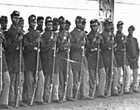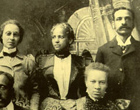A special edition of the Louisville Daily Courier was detailed and direct in its message to non-slaveholders. The abolition of slavery would raise African Americans to "the level of the white race," and the poorest whites would be closest to the former slaves in both social and physical distance. Thus, "do they wish to send their children to schools in which the [N]egro children of the vicinity are taught? Do they wish to give the [N)egro the right to appear in the witness box to testify against them?" Then the article moved to the final and most emotionally-charged question of all. Would the non-slaveholders of the South be content to "AMALGAMATE TOGETHER THE TWO RACES IN VIOLATION OF GOD'S WILL." The conclusion was inevitable the article argued; non-slaveholders had much at stake in the maintenance of slavery and everything to lose by its abolition. African-American slavery was the only thing that stood between poor whites and the bottom of southern society where they would be forced to compete with and live among black people.
These arguments were extremely effective as even the poorest white southerners got the message. Their interest in slavery was far more important than simple economics. As one southern prisoner explained to his Wisconsin-born guard "you Yanks want us to marry our daughters to niggers." This fear of a loss of racial status was common. A poor white farmer from North Carolina explained that he would never stop fighting because what he considered to be an abolitionist federal government was "trying to force us to live as the colored race." Although he had grown tired of the war, a Confederate artilleryman from Louisiana agreed that he must continue to fight. An end to slavery would bring what he considered horrific consequences, for he would "never want to see the day when a [N]egro is put on an equality with a white person." Even northern soldiers understood the passion with which the Confederates fought to protect the institution of slavery. Most Confederates would have agreed with the assessment of a Union soldier in 1863, shortly after the passage of the Emancipation Proclamation. "I know enough about the southern spirit," he said, "that I think they will fight for the institution of slavery even to extermination." Fears of the consequences of abolition fostered white solidarity, forming the load-bearing pillar in the foundation of Confederate nationhood.
Although the defense of slavery was central to the Confederacy, the abolition of slavery was not initially the official goal of the United States or the primary concern of most of the American people. As the most respected historians of our generation have shown, Lincoln and the vast majority of Republicans sought only to limit the expansion of slavery. Most who supported this "free soil" program that would maintain the western territories for free labor, did so out of self-interest. To urban or farm workers or to northern small farmer owners, Republicans offered the possibility of cheap land devoid of competition from slave labor or even from free blacks, who faced restriction in western settlement. "Vote yourself a Farm," was the not-so-subtle Republican message to white laboring men with the understanding that the western territories, having undergone Indian removal in the 1830s and 1840s, would be racially homogeneous.





